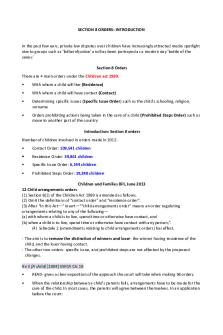Non-discrimination and residence rights PDF

| Title | Non-discrimination and residence rights |
|---|---|
| Course | EU Law |
| Institution | University of Chester |
| Pages | 3 |
| File Size | 47.5 KB |
| File Type | |
| Total Downloads | 69 |
| Total Views | 137 |
Summary
This document provides : Non-discrimination and residence rights, and Family and carer rights, All supported by the relevant cases....
Description
Non-discrimination and residence rights
Case C-413/99 Baumbast and R v Home Secretary
Mr Baumbast, a German national, was self-employed in the UK, where he resided with his Colombian wife and two children, who were being educated in the UK. He was subsequently employed by a German company and worked outside the EU. His family remained in the UK. Their residence permits were not renewed, however, and Mrs Baumbast and the children faced deportation.
In the most important statement of the judgment, the CJEU held that this right to stay under Article 18(1) EC (now 21(1) TFEU) is conferred directly on every citizen of the Union by a clear and precise provision of the EC Treaty (i.e. it has direct effects). Purely as a national of a member state, and consequently a citizen of the Union, Mr Baumbast therefore had the right to rely on Article 18(1) EC.
Family and carer rights
The rights of residence could be subject to objective restrictions, but must comply with fundamental rights and (at [42]–[43]).
Case C-413/99 Baumbast and R v Home Office
The UK authorities wanted to deport the American national, R. However, because her children had a right to remain and to pursue, under the best possible conditions, their education in the host member state, the CJEU reasoned that this necessarily implies that those children have the right to be accompanied by.
The Court held that Regulation 1612/68, interpreted in the light of Article 8 of the ECHR, entitled the parent who is the primary carer of those children, irrespective of nationality, to reside with them in order to facilitate the exercise of that right, notwithstanding the fact that the parents have meanwhile divorced.
Hence, the right to a family life protected by Article 8 ECHR has been instrumental in achieving far-reaching judgments on the rights of family members of Union citizens and is clearly beyond any strict interpretation of EU law rights.
Case C-200/02 Chen,
The EU citizen concerned was Catherine, the new-born daughter of a Chinese national, Mrs Chen, who was visiting the UK with her husband and who went to Belfast to give birth to Catherine. Under Irish law at the time, any person born in any part of the island of Ireland could acquire Irish nationality and Catherine was subsequently issued with an Irish passport. It was noted as a matter of record by the CJEU that this factual situation was deliberately engineered in order for the child to get EU citizenship and so that the parents could subsequently acquire a right to reside in the UK.
The CJEU concluded that Article 18 EC (now 21 TFEU) and Directive 90/364 confer a right to reside for an indefinite period on a young minor who is a national of a member state, and who is covered by appropriate sickness insurance and is in the care of a parent who is a TCN having sufficient resources for that minor not to become a burden on the public finances of the host member state. In such circumstances, those same provisions allow a parent who is a minor’s primary carer to reside with the child in the host member state.
Thus, EU law does not require member states to admit non-EU spouses or family members where no such right in national law exists and the possibility of moving to another EU state exists....
Similar Free PDFs

Week 2 - Residence and source
- 3 Pages

Human Rights and IR
- 1 Pages

S8 orders - contact & residence
- 20 Pages

Residence - bibi john
- 3 Pages

Form-EUTR1 Irish Residence Card
- 44 Pages

Property 8- Rights and things
- 13 Pages

Rights and Duties of Agent
- 5 Pages

Real Rights v Personal Rights
- 11 Pages

5Media- Sports- and Civil Rights
- 1 Pages

Human rights and strip searches
- 7 Pages

MSU Texas residence-life-handbook
- 43 Pages

Human Rights
- 167 Pages
Popular Institutions
- Tinajero National High School - Annex
- Politeknik Caltex Riau
- Yokohama City University
- SGT University
- University of Al-Qadisiyah
- Divine Word College of Vigan
- Techniek College Rotterdam
- Universidade de Santiago
- Universiti Teknologi MARA Cawangan Johor Kampus Pasir Gudang
- Poltekkes Kemenkes Yogyakarta
- Baguio City National High School
- Colegio san marcos
- preparatoria uno
- Centro de Bachillerato Tecnológico Industrial y de Servicios No. 107
- Dalian Maritime University
- Quang Trung Secondary School
- Colegio Tecnológico en Informática
- Corporación Regional de Educación Superior
- Grupo CEDVA
- Dar Al Uloom University
- Centro de Estudios Preuniversitarios de la Universidad Nacional de Ingeniería
- 上智大学
- Aakash International School, Nuna Majara
- San Felipe Neri Catholic School
- Kang Chiao International School - New Taipei City
- Misamis Occidental National High School
- Institución Educativa Escuela Normal Juan Ladrilleros
- Kolehiyo ng Pantukan
- Batanes State College
- Instituto Continental
- Sekolah Menengah Kejuruan Kesehatan Kaltara (Tarakan)
- Colegio de La Inmaculada Concepcion - Cebu



